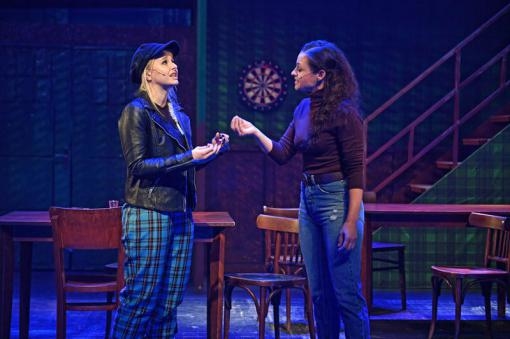Yesterday Brno City Theatre gave the European premiere of the musical The Last Ship, written by the world-famous musician Sting. It is a mixture of his wonderful music drawn from British folk, a successfully and honestly told tale and also a strong acting performance, which should guarantee the production’s successful voyage to the audience.
To be aware of the context however it is necessary to recall that in 2014, when Sting’s musical had its premiere on Broadway, The Last Ship was a failure with audiences. The stumbling block was not that Sting provided poor music, but rather the style of music that he chose. The musical was mainly acoustic and folk-based. Pop-oriented America clearly did not want to listen to violins, mandolins, bagpipes and the thunderous songs of riveting shipbuilders. Possibly he also missed the mark with the social theme of redundant workers – one of the central motifs of the musical. Furthermore most of the songs here are ballad-like, sad and very slow, which clearly did not win over Americans with their love of musical sugar candy.
At the same time it is necessary once more to stress that Sting’s musical has, not just as musical entertainment, but also in the architecture of the whole tale, the quality of being truly authentic, honest and direct. Herein lies his main strength, it just needs to be brought to life on stage without sentimentality, which Stanislav Moša’s production manages despite the slightly awkward start to the first choral numbers.
In this retro tale the famous musician has drawn on memories of his birthplace of Wallsend with its huge shipyards, which at the start of the last century were among the largest in the world. After many years of problems however they closed. That is the social framework of The Last Ship but there are many individual stories, both of old shipbuilding foreman Jackie White and his wife Peggy or the return of the protagonist of the musical Gideon Fletcher, who ran away from his hometown and his love Meg and after seventeen years returns to find a teenage daughter and an old love, that unlike ships’ hulls, has not rusted. Everything is constantly growing through the professional pride of poor people connected with the sea and shipbuilding, and although it sounds unromantic, Sting's musical contains much tenderness, love and quirky humour.
In agreement with the headline of the New York Daily News – Sting’s Ship is Propelled by his Rich Music. And it is the musical approach and production (Dan Kalousek and František Šterbák) that is the basis for the success of the Brno production. I have already mentioned how the original Broadway, almost acoustic version of the musical was played by what was virtually a chamber ensemble. In Brno the music was arranged for a large orchestra, which emphasised its excellent quality. This arrangement pushed into the background the music of Irish traditional instruments and sounds while bringing forward the symphonic dramatic quality of the material. This approach also suits the form of the Brno production, which in places reminds us of a commemorative musical fresco, paying tribute to human creativity, pride and desire for freedom.
The director Stanislav Moša together with creator of the stage sets Christoph Weyers and the author of the projection Petr Hloušek attempted a bombastic, but never overblown show. Here the size of ship docks filled is simulated with cranes reminiscent of ‘prehistoric creatures grazing mindlessly’ as Sting later writes. Weyers works with staging tables, from the traps for example the interior of Gideon’s flat, only for the heavy door leading to the yard to be launched from the top once again. The already mentioned projection also gives motion to the production, in which there are stormy sea waves, or water is sprayed skywards or in the end that last ship really sails for the horizon. A certain civilism without any kind of costume theatricality on the stage is also created by the costumes of Andrea Kučerová, drawing on period clothing.
The modesty and sincerity of Sting's musical on stage has to be affirmed by the performers; it is not a matter of oversophisticated gadgets. It is pleasant to be able to say that the ensemble of the Brno City Theatre has in every generational category its true personalities and mature actors – from the youngest to seasoned matadors. Let us be specific. In the first premiere Dagmar Křížová shone in the role of the seventeen-year-old Ellen. The audience enjoyed not only an excellent singing performance, but also the fact that in her role as a teenager she did not go for an elfin image. The bravura and experience that Radka Coufalová offered in her role as the abandoned mother left to cope on her own, is also worthy of recognition. Coufalová’s performance is one of the highlights of the evening. With Dušan Vitázek the actor formed an ideal couple, whose complex bonding is a delight to viewers. A similarly thoughtful performance that did not stray into the territory of a caricature of a party member was given by Petr Štěpán as the zealous foreman Fred. And the cherry on the imaginary cake is Ladislav Kolář and Zdena Herfortová in the roles of the aging White couple. Here we are talking of the very essence of musical acting, that makes the result an attractive production; dramatic, highly attractive and artistically intriguing.
Moša’s production of the musical The Last Ship in its visual attractiveness, persuasive acting and musically seductive package confirms the quality of Sting’s opus. It can be confirmed with appreciation that this production will be travelling to continental Europe (there are going to be other productions on German soil) from Brno.
































No comment added yet..